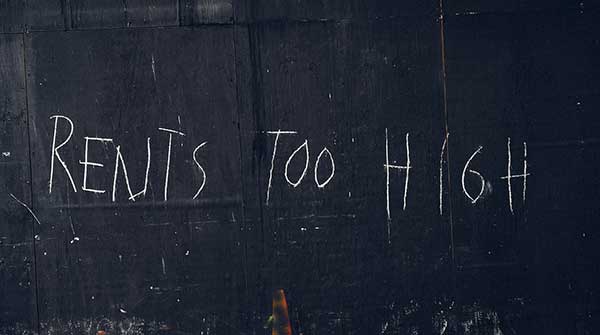Gradually, entire cities are becoming unaffordable for working families
 A new report from the Canada Mortgage and Housing Corporation (CMHC) shows that rents are skyrocketing in many, if not most, Canadian cities. No surprise there. But this year’s annual report also documents, for the first time, rent increases in vacant units. It shows rents going up by an average of 18 per cent between tenancies. In some cities, average increases are close to 30 per cent.
A new report from the Canada Mortgage and Housing Corporation (CMHC) shows that rents are skyrocketing in many, if not most, Canadian cities. No surprise there. But this year’s annual report also documents, for the first time, rent increases in vacant units. It shows rents going up by an average of 18 per cent between tenancies. In some cities, average increases are close to 30 per cent.
So who is to blame for these whopping rent increases?
Between 10 per cent and 35 per cent of rental units in urban areas become vacant every year. This means that within just a few years, rent for large shares of units increases well above wages, gradually making entire cities unaffordable to working families.
Big rent increases also make moving expensive.
|
|
| Related Stories |
| Blaming foreigners will not resolve the housing shortage
|
| How to create more affordable housing to meet rising demand
|
| Bank of Canada’s interest rate strategy is failing Canadians
|
According to the CMHC report, the average asking rents for vacant two-bedroom units in Victoria were $530 higher than the rent paid in occupied units. The gap is around $400 in Calgary and Toronto, $350 in Montreal, and $205 in Halifax. In other words, moving to a same-size unit within these cities can cost between $2,500 and $6,400 in additional rent a year.
The freedom to move to where work, family, or lifestyle choices take you is one of the many underrated benefits of renting, but not when the price tag of moving is this high.
Worst of all, the absence of rent controls in vacant units encourages evictions.
When landlords can hike up rents by however much they want between tenancies, a good tenant is a tenant who is about to move out. Landlords have no financial incentive to keep long-term tenants. On the contrary, they have an incentive to push them out.
In fact, many bad landlords create pressures for tenants to leave. These take different forms: consistently increasing rents to the maximum allowed, ignoring repair requests, or imposing new rules that make day-to-day life uncomfortable or unpleasant.
There are also the notorious renovictions. Some landlords kick out tenants on a false pretense, only to give the place a fresh coat of paint and put it back on the market at a higher rent.
With so much talk these days about inflation, high gas prices, and grocery bills going through the roof, average rent hikes of 18 per cent should instantly make splashy national news. But they didn’t.
They didn’t because no one, apparently, is ever responsible for soaring rent prices. In Canada, when rents go up, we blame “the market.”
The CMHC report is a case in point. It explains that, with the end of pandemic restrictions, youth can again find jobs and move out on their own. Immigration numbers are picking up, increasing demand for rentals. And with high interest rates, prospective first-time homebuyers are deciding to rent for longer. Although a lot of new rental units entered the market in recent years, demand has outpaced supply, the report explains.
This analysis is not incorrect. But it is only part of the story – the one most often told.
The other part of the story is about choices.
Canadians don’t have to be held hostage by market forces. Governments have many ways to protect families’ basic need for housing – if they so choose.
In Ontario, B.C., Manitoba, and P.E.I., occupied units are protected by rent controls that curb excess profit while allowing rents to keep up with inflation.
Only P.E.I. and Manitoba have controls on vacant units. They used to be more common, but most provinces have lifted them, allowing the few landlords to charge more from the many tenants.
So let’s not blame “the market” for our woes. Landlords choose to hike rents to increase profits, and our governments choose to let them.
Ricardo Tranjan is a political economist with the Ontario office of the Canadian Centre for Policy Alternatives and author of the book The Tenant Class.
For interview requests, click here.
The opinions expressed by our columnists and contributors are theirs alone and do not inherently or expressly reflect the views of our publication.
© Troy Media
Troy Media is an editorial content provider to media outlets and its own hosted community news outlets across Canada.

